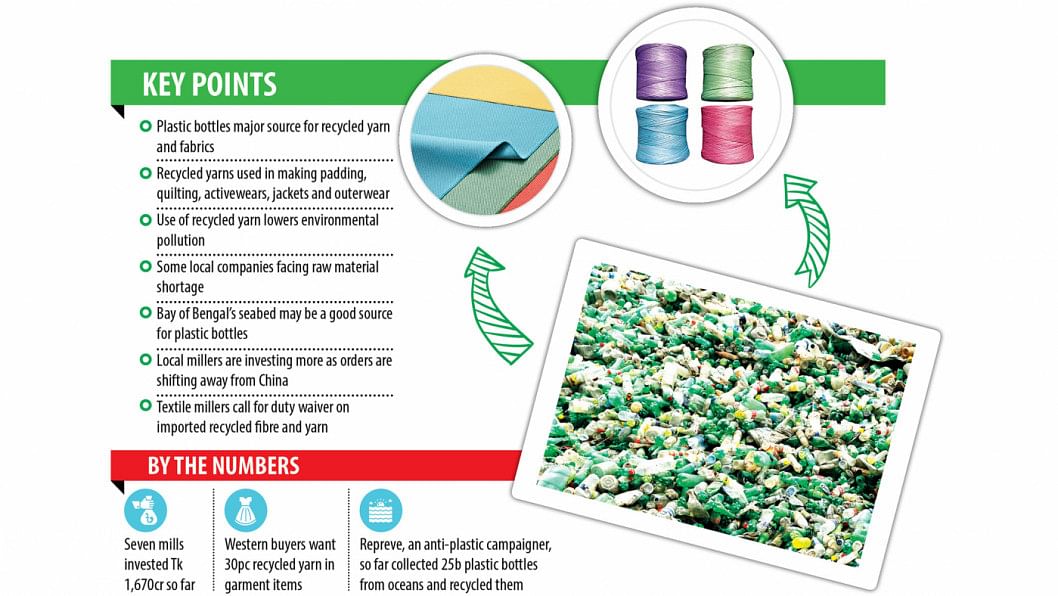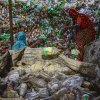Recycling plastic bottles to make garments

Bangladesh is set to become a major source of recycled yarn and fabrics made from plastic bottles as the country looks to capture more market share of global high value-added garment items such as activewear, outerwear, padding and quilting.
Seven local mills have already set up plants investing Tk 1,670.73 crore collectively in order to make flakes from waste plastic bottles in order to make recycled yarn and fabrics, according to the Bangladesh Textile Mills Association (BTMA).
Globally, the recycling of plastic bottles for clothes is a growing trend, as conscious consumers in the western markets are demanding more garment items be made from recycled yarn in order to save the earth from plastic pollution.
As a result, international retailers and brands are increasingly asking suppliers to add 25 per cent to 30 per cent of the raw material to the finished garment items.
Another factor is the cost of production in China, the biggest producer of yarn made from plastic bottles, has increased a lot. This has prompted Bangladeshi millers to pump thousands of crores of taka into producing yarn and fabrics from plastic items.
Debonair Group, located in Bhaluka of Mymensingh, collects 30 tonnes to 40 tonnes of plastic bottles daily from vendors to make chips, then fibre and then yarn before producing garment fabrics.
Ayub Khan, managing director of the group, says he is hopeful that the group can start manufacturing plastic flakes in the new plant by 2022.
The construction of the plant has been delayed for a year because of the fallouts of Covid-19.
Currently, Debonair Group imports $20 million worth of fibre and yarn made from plastic bottles mainly from China to make quilts, jackets, padding and outerwear for its international buyers in Europe and in the US.
Once the production in the new plant starts, Khan is expecting to collect a significant quantity of plastic bottles from the domestic market.
The initiative of Debonair Group is helping save the environment by reusing plastic bottles, Khan said.
Singair, Manikjganj-based Mumanu Polyester Industries Ltd has a daily production capacity of 120 tonnes of yarn from plastic chips and fibres. But it is running at half of the capacity because of the shortage of raw materials, said Managing Director Abul Kalam Mohammad Musa.
The company collects plastic bottles from the local vendors, who buy them from small traders in villages and urban areas. Musa started his factory in 2017.
Zaber & Zubair Fabrics Ltd also makes yarn and fabrics from the flakes of plastic chips imported from China, said Mokhlesur Rahman, senior executive for product development of the company.
The international buyers of the company select the recycled yarn to be mixed with the woven fabrics before manufacturing apparel items. So, at Zaber & Zubair Fabrics, 25 per cent recycled yarn is added with the woven fabrics to get better prices from its global clients.
The company also purchases recycled fibres from Repreve, a global platform for recycling plastic bottles, which are collected from the oceans in order to turn them into fibres.
"We import the fibre as per the requirement of international retailers and brands," said Rahman, adding that woven, activewear like jerseys, and outerwear are made from recycled plastic yarn.
He says a company can collect plastic bottles from the seabed of the Bay of Bengal to process them into yarn to be used in making garment items.
Monsoor Ahmed, chief executive officer of the BTMA, says local mills collect plastic bottles and turn them into chips and yarn as the demand for plastic yarn is growing worldwide because of the comfort, durability and longevity of the dresses made from such raw materials.
As a result, international buyers are asking suppliers to add 25 per cent to 30 per cent recycled plastic yarn to cotton yarn.
The BTMA urged the National Board of Revenue to waive the duty on the imported recycled plastic fibre and yarn so that local producers can grab more share of the global recycled garment market.

 For all latest news, follow The Daily Star's Google News channel.
For all latest news, follow The Daily Star's Google News channel. 




Comments